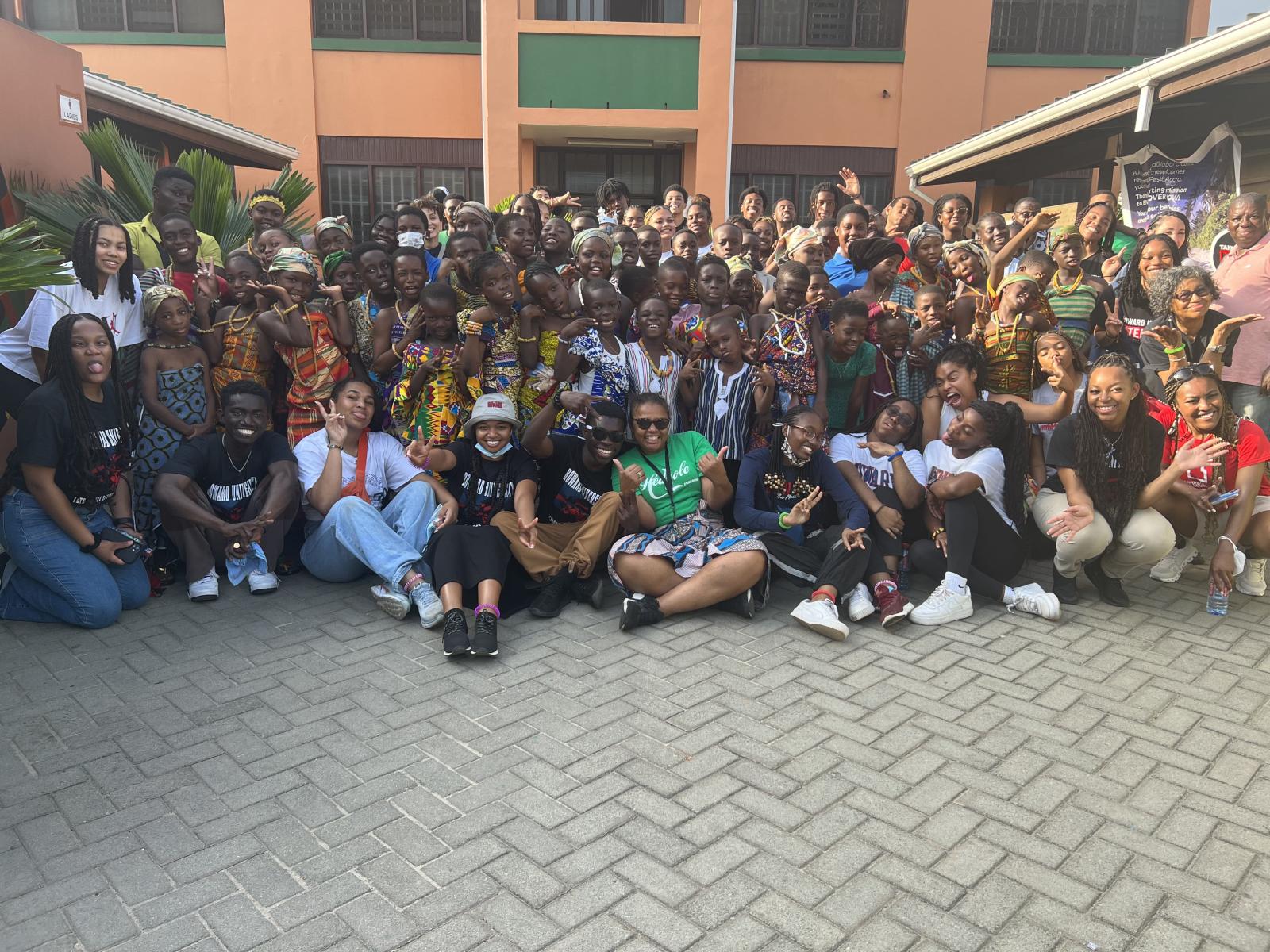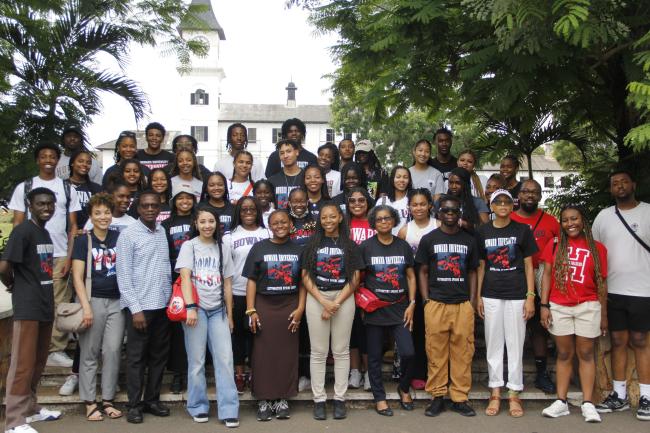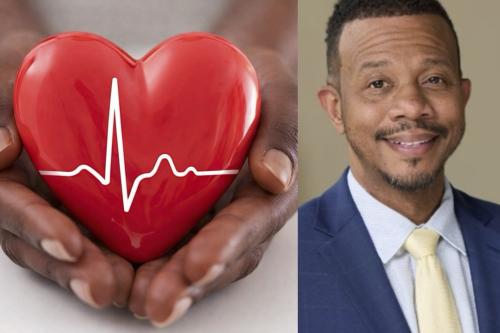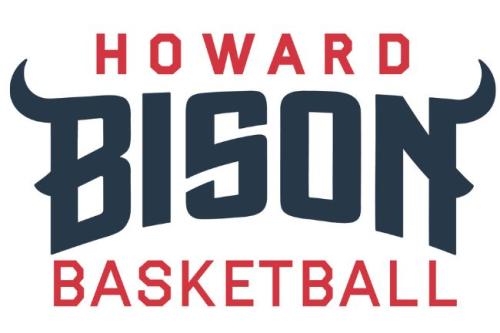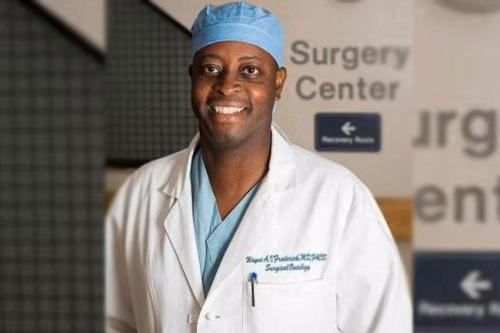During Howard University’s Alternative Spring Break, student groups traveled around the nation and the world to provide services to underserved populations. From collecting food resources to combat food insecurity in Texas, to reading with Minnesota’s students to increase reading levels in Black youth, the week-long trip exudes what lies at the heart of Howard University: Bison who represent the University’s longstanding commitment to truth and service.
The student group servicing organizations in Accra, Ghana marked a new location that expands’ ASB served populations. A total of 39 students attended the trip as five staff members served as advisors. Dahlia Nduom, the Ghana site advisor and a Department of Architecture professor and Gideon Boadu, a Ghanian sophomore, discussed their experience and the importance of Alternative Spring Break.
ASB Ghana site coordinator: Dahlia Nduom, Department of Architecture professor
Q: Why is it important that students connect with the African continent and expand their understanding of who they are as African people? How does this align with Howard's mission and the HU experience in general?
A: Howard University’s mission is focused on developing “distinguished, historically aware, and compassionate graduates” who aim to discover “solutions to human problems in the United States and throughout the world.”
In order to achieve this mission, it is pivotal for students to understand the African continent and its rich history, culture, and architecture. Allowing students the opportunity to visit the continent is an extension of the rich teaching, research and service already happening on campus focused on the continent. Students have already discussed this trip motivating them to go back to make a difference in the world based on the experiences and connections they have made thus far as they serve in communities in Ghana. Experiences like connecting to one’s ancestors and understanding their ancestry is extremely important, especially as conversations around critical race theory and the dilution of African American studies courses have become prevalent in certain states. I am confident that this experience has strengthened students’ connection to the mission of Howard and will motivate them to use the skills gained in their education to drive change in the world.
Q: What feelings did students experience touching African soil?
A: Students have expressed a connection to their ancestors, of feeling that they have been welcomed home. It has been great to see their reactions to Ghana, embracing its beauty, its culture, its architecture and even its flaws. This amazing group of students seems to feel a new connection and motivation to drive change in the world and I am honored to have been able to witness their experiences on this trip. I’m looking forward to all the great things they will do when they get back!
ASB Site Coordinator: Gideon Boadu, sophomore chemical engineering major, computer science and mathematics double minor
Q: Why Ghana?
A: Ghana was chosen as an ideal location because of its rich history, political stability and because it serves as the bridge between the African continent and the Diaspora. As part of the HUASB programmatic schedule, time is always allocated for cultural immersion activities. For the cultural immersion activities in Ghana, we visited Elmina Castle and the Kakum National Park. These places were chosen to provide a balance between Ghana’s beautiful landscape and honoring the history of past events that forever changed the communities in Ghana.
Q: What did students do while in Ghana?
A: Students served in Ghana’s capital city Accra under the initiative of Youth Empowerment and Education. As part of the initiative, students worked in schools, afterschool institutions and with the Archiafrika Foundation at their cafe in Jamestown, including Kwame Nkrumah Memorial School and Achimota Senior High School. The remaining service site was BASICS International, an afterschool institution. Activities included college readiness talk, career mentorship, classroom setups, shadowing teachers, photography lessons, and painting lessons. At ArchiAfrika, we worked with children from the Jamestown Gbekebii Creative Arts School on masks using upcycled materials and co-created a painting based on the kids’ ideas and thoughts.
We participated in a participatory design session with various stakeholders including architects, community members and youth from the D’Rose Foundation Cultural Dancers in Jamestown. We used various participatory design tools to discuss the community priorities as students, and community members worked together to develop ideas for the design of a Ghana Green Marketplace in Jamestown. We hope we left the youth of Ghana with a new energy and perspective to take on the world and pursue their goals. The Howard University Alternative Spring Break (HUASB) program aims to give back to global communities through impactful service led by student leaders. Every community needs help one way or the other.
Q: What has this experience meant to you?
A: The University’s motto “In Truth and Service” became so much clearer to me when I learned so much truth about my country on a University-sponsored service trip. As a Ghanaian, you would expect me to know most of the things, but everything I learnt from the places we visited was new to me and I am really appreciative of the opportunity to be on this trip.
It is so important students get the chance to connect with the African continent. Being able to explore and question concepts we’ve learned from a very young age is life changing at this point in our growth. Learning about who we are as African people, and being able to serve our brothers and sisters, embodies Howard University Alternative Spring Break’s mission.
